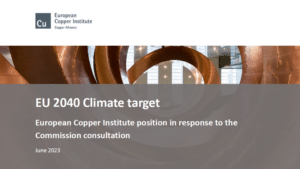The European Commission has defined copper as a strategic raw material, acknowledging that copper is indispensable for achieving the EU’s objective of a carbon-neutral economy. Indeed, copper is a crucial raw material for electrification and for the energy transition at large and copper demand in the EU is expected to increase by 35% by 2050 as the continent decarbonises. Copper extraction, processing, and recycling also allows to produce or recycle many other non-ferrous metals that are important for the transition.
The copper producers that the European Copper Institute represents in Europe have committed to a goal of reducing the scope 1 and 2 GHG emissions of their copper production to net zero by 2050. Provided that key enabling conditions, such as access to competitively priced decarbonised electricity, are fulfilled, it is possible to reduce the scope 1 and 2 GHG emissions of copper production in Europe by 30-40 percent by 2030 and by 85-95 percent by 2040, compared to a no-action scenario.
The European Copper Institute (ECI) supports the EU’s climate ambitions for 2030 and 2050. Ambitious policies are needed to increase electrification, the deployment of renewables and energy efficiency to decarbonise the European economy and reduce dependency on Russian fossil fuels. Climate action must build on a fast decarbonisation of the electricity grid, combined with efficiency in all sectors and electrification whenever possible.
At the same time, it is crucial that these policies consider the need to maintain the global competitiveness of European energy-intensive industries, in particular the strategic raw material industries. Today, these industries are struggling with the consequences of the energy crisis, and will continue to struggle through this decade as electricity prices remain high and increasingly volatile, while the carbon price increases further and free allocation of emission allowances is drastically cut under the revised ETS Directive. The EU must support the decarbonisation efforts of these industries and take care not to undermine their global competitiveness. Not integrating these two elements in EU policy would ultimately lead to an increase in less climate-constrained production outside the EU, as well as a deepening EU raw material dependency on China and other third countries.
Indeed, a key challenge for the EU’s goal to become climate neutral relates to the availability of raw materials needed for decarbonisation technologies. Today, high energy prices, complex regulatory frameworks and long permitting processes for mining and processing projects make the EU a difficult place to invest for the producers of these materials. The Critical Raw Materials Act is a welcome initiative that could tackle some of these aspects. However, ensuring a climate neutral and resilient Europe requires broader action, for instance to ensure internationally competitive prices for industrial electricity supply and to retain robust protection against carbon leakage in the EU’s climate policies.
Overall, coherent policies are needed for climate action, environmental protection and industry competitiveness that take into consideration the need to strengthen the EU’s strategic autonomy in raw materials needed to reach carbon neutrality.

